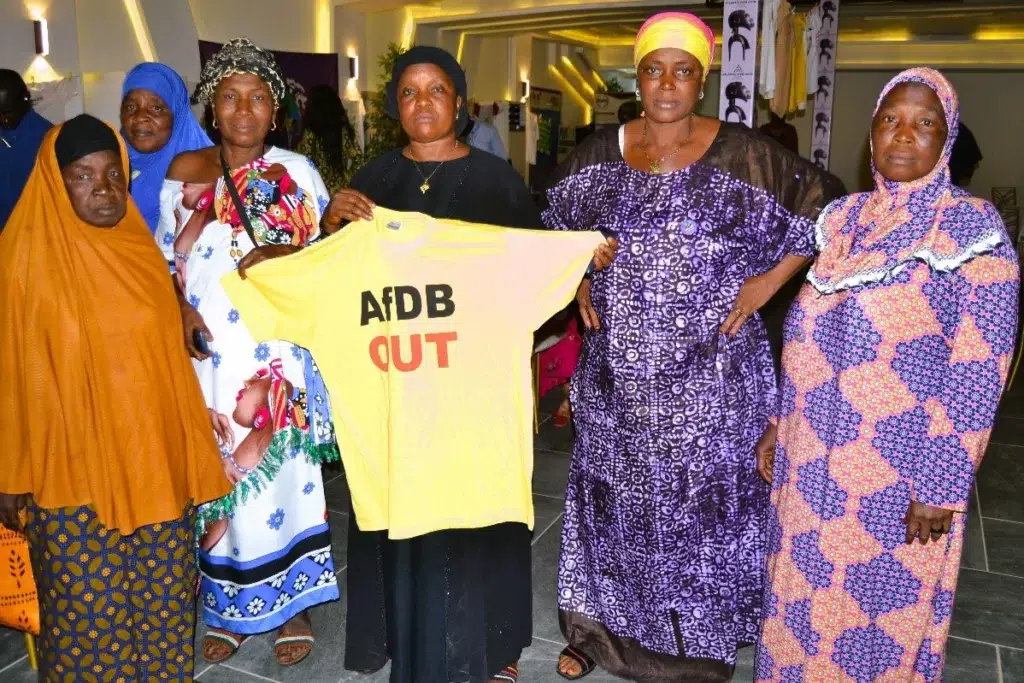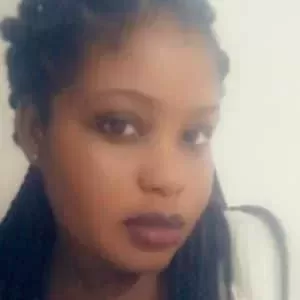(Photo: Women from the communities of Damouya, Kansa, Woleah, Bangouyah, Balayah,
and Tahire attending the Campaign Strategy meeting in Guinea Conakry)
Women resisting African Development Bank projects demand reparations
"My children and I have nowhere to sleep. Our house has been blown away by a strong wind from the dam".
This is the lament by a woman from Batchenga in Cameroon. She is just one of many community members impacted by the construction of the 420 MW Nachtigal hydroelectric dam on the Sanaga River, which is financed by the African Development Bank (AfDB) and other International Financial Institutions (IFIs). Like the people of Batchenga, many other communities across Africa have been suffering from the disastrous impacts of AfDB-funded projects for several decades. The consequences of ‘development’ projects financed by the African Development Bank are stark whilst the suffering of those who are affected continues. Women and their communities are organising to say NO to the heavy toll of projects imposed by the AfDB that perpetuate a capitalist, neo-colonial development model for Africa.
The opens in a new windowlegal provisionsopens PDF file on which the African Development Bank was founded demonstrate that the AfDB is an adherent of the Universal Charter of Human Rights and the African Charter on Human and Peoples’ Rights. This implies that all its processes and mechanisms must respect the provisions of these declarations, not only in their formulation, but especially in their implementation on the ground. The AfDB’s failure to do so and respect its commitments should be considered as a violation of its obligations. This breach should also mean that women and communities that are facing harmful impacts of AfDB-funded projects have a right to reparations and just compensation.
Building a campaign targeting the AfDB
WoMin African Alliance and its partners, Coalition pour l ’Abolition de la Dette Illegitimate (CADTM) Afrique, Lumiere Synergie pour le Developpement (LSD), and Centre du Commerce International pour le Développement (CECIDE), organised a meeting with 60 women and community activists to develop a reparations campaign targeting the AfDB.
Held In Guinea Conakry, the meeting gathered women from the local communities of Damouya, Kansa, Woleah, Bangouyah, Balayah, and Tahire, all of whom are heavily impacted by the AfDB-funded OMVG energy project. In addition, the convergence brought together participants from 11 other countries in West and Central Africa, namely Mali, Senegal, Ivory Coast, Burkina Faso, Mauritania, Gabon, Cameroon, Niger, Nigeria, and Ghana.
All the participants shared their experiences of forced displacement and the loss of farmland making it impossible to continue livelihood activities. Communities are also struggling to get just and adequate compensation. The meeting was a vital opportunity for women from West and Central Africa to stand in solidarity with their Guinean sisters.
Testimonies of impacts
The first day focused on giving a voice to communities impacted by the AfDB funded projects. Those who are on the frontlines who bear the full brunt of the negative impacts of mega development projects shared similar experiences. Women testified about the everyday realities that they and their communities face and how they have been dispossessed of their livelihoods. In most of the cases, they have lost their land, which they used for farming. Carine Tsimba Mouity from Gabon said, "The AfDB-funded GRAINE oil palm project in Gabon is depriving the Ferra and Ndende communities of their legitimate right to move freely and use their land for food production.”
Women and their communities also no longer have space to practice economic activities that used to guarantee them a minimum income to take care of themselves and their families. Fish and vegetable farming, sand quarrying, catering and many other activities no longer exist for them. Thus, dispossessed of their land and lacking any source of income or the possibility of exercising an economic activity, the women are concerned for the future of their families and communities.
Although compensation was granted to some of the communities as is the case with Taboth and Akrou in Ivory Coast or Batchenga in Cameroun — it must be noted that the consultation and census processes that preceded the payment of these compensations were biased in many respects. These include inadequate consultations with the communities, and the failure to consider their . Themethodologies for calculating the basis of compensation were often unclear. Some community members were not considered part of those impacted by the projects and therefore did not receive adequate compensation. Due to forced displacement, many of these communities have also lost the connection to their sociocultural traditions and way of life.
In the village of Ndokoa, Cameroon, a traditional practitioner who lived on the banks of the Sanaga River shared how unhappy she is with her resettlement. She was never consulted for the choice of the site nor for the construction plan of her new house. Her house, assigned to her by the Nachtigal Hydropower Company, lets rainwater through the roof. The nearest water source is often dried up, and she no longer has access to the medicinal plants and herbs she used to treat the sick in her community. She is forced to hire young people to gather these plants on the opposite bank of the Sanaga River. As a result, this guardian of traditional medicinal knowledge suffers as do her patients.
A way forward to demanding reparations
Women from Dorma Kantinka in Ghana shared their powerful campaign to denounce the abuses and injustices that they and their communities have experienced. They are also fighting to defend their rights and demand reparations for the damages and harm suffered from so-called ‘development’ projects.
For the sixty or so participants, this meeting strengthened their shared knowledge about the Bank, its processes, mechanisms, membership, and the internal and external power dynamics at play. It was an opportunity to generate critical analysis of the AfDB, questioning its role in the policies and processes of Africa’s development, and how it relates with other IFIs like the International Monetary Fund (IMF) and the World Bank. The group was particularly concerned about the AfDB’s role in the debt burden of African countries. There was also great interest in cost analysis as a critical tool for making visible the socio-economic and environmental costs of AfDB-funded projects.
CADTM Africa has launched an appeal for the cancellation of the opens in a new windowdebt of African countries: "Public debts that do not serve the development of African countries must be cancelled,” said coordinator Broulaye Bagayoko.
An annual action plan for 2023-2024 has been defined and will guide the group’s actions in the weeks and months to come. For participants present at the strategic meeting in Conakry, it is essential to organise and resist. "It is a question of survival. We must resist because we have no other option. Resist or die because we have nothing left anyway," said Hannah Owusu-Koranteng of WACAM Ghana.



